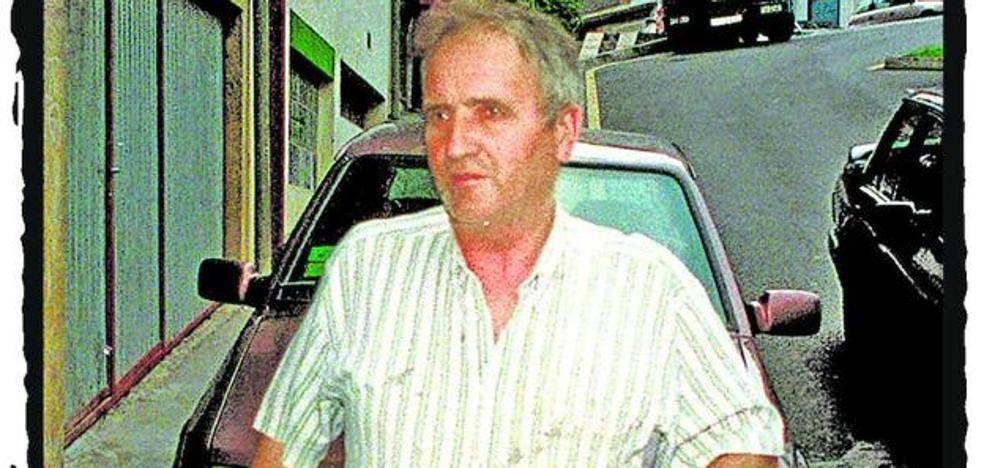Miguel, Miguel Ángel’s father, arriving home with his work clothes and a disjointed gesture. /
25 years without Miguel Ángel Blanco
INTERVIEW. ALBERTO MARTIN, ERTZAINA
Six agents from the Eibar police station protected them and accompanied them at home and went with them to the demonstrations, to the hospital and to the funeral
At the Ertzaintza police station in Eibar they were used to kidnappings. On October 29, 1993, after 116 days in captivity, Julio Iglesias Zamora was released by ETA at the Arrate pass, between Eibar and Elgoibar. Nearby, at the top of Azkarate, José María Aldaya was released on April 14, 1996 after the longest kidnapping perpetrated by the gang until then: 341 days. The two fell in the demarcation that covers the Eibar police station and is a few kilometers from Elorrio, where ETA released Cosme Delclaux on July 1, 1997, and from Arrasate, where the Civil Guard released Ortega Lara a few hours later. “We knew of kidnappings but we had never had an execution date on the table. No one was prepared for a kidnapping like this and with so little room for manoeuvre,” admits Alberto Martín. He is one of the six ertzainas that made up the group that was immediately created to protect and accompany the family of Miguel Ángel Blanco. They all used to work in civilian clothes.
“We were with them 24 hours a day, from the moment the kidnapping took place until a couple of weeks later,” recalls Martín. The team of Ertzaintza agents was still at the Blancos’ house when, about ten days later, an infamous call was received. «Very few people know it, but ETA committed the indecency of calling the family home to justify Miguel Ángel’s crime. They had the unfortunate idea of justifying the death with accusations about the politics of the PP and the prison situation. “That call is recorded. It will be in the hands of the Interior », he adds.
«We worked two or three, in shifts. We stood guard at their house and accompanied them to all the outings. Morning, afternoon and night. We were at the demonstrations to ask for their release, they wrote the communiqués with us and then we had to accompany them to the fourth floor of the Aranzazu hospital, which was reserved for the family and the institutions. We were with Chelo and Miguel and with some position in the PP when they were informed that the second encephalogram had come out flat -it was the verification, a few hours after the first test-, which meant that he went from brain death to real death. Those moments, what I saw there in the hospital, I will always keep in my memory. I keep them to myself. I have to say that the Blanco Garrido family has always been exemplary, affectionate and exquisite in dealing with all of us who participated in the search for their son.
Alberto Martín had to make part of the numerous calls that followed. «He had to communicate it to the magistrate of the National Court. There were no cell phones at that time, not even in the Ertzaintza. We had to buy earpieces because at that time we didn’t have any.” He keeps memories of those days in a drawer, like the gold Ray-Ban glasses that all the agents wore when they went out with the Blanco family. “We had taken off the welt and the glasses were useful,” he admits.
sustained stress
There were six ertzainas who protected the Blanco family. «One of the companions committed suicide two years ago with a shot to the head. He was a good friend, very loved, a healthy uncle », he recalls. He was the ertzaina who helped Michelangelo’s father into the house when he arrived from work that day, wearing work clothes and a distraught expression at the certainty that the tumult in the doorway was about his eldest son. An image that shocked Spain.
Like his partner, Alberto Martín also tried to take his own life. «He had ended up in a wheelchair due to a spinal cord injury derived from nerve problems, like many colleagues who were in the Basque Country. And I searched for a definitive solution to a temporary problem. I tried to end my life », he confesses. He changed his life and moved to Seville. «I left with the support of my mother and created the Andalusian Association for the Prevention of Police Suicide». In the city of Seville, where he managed to walk again, they attend to colleagues from all corps in facilities provided by the Jupol union.
What took its toll on these agents wasn’t just Blanco, of course. “The slab is all these years,” he sums up. The stress of the terrorist threat, sustained for years, left its mark on many agents who worked in the Basque Country. Alberto Martín was the youngest police officer approved by the opposition to become an ertzaina, having just turned 18. «When I was 24 I came out on the first ETA list. I have appeared in three. He had to go live in Cantabria. “Friends took it as normal that a kid of that age had to leave,” he recalls. Unthinkable things. He adds one more. “Blanco’s murder weapon has never been found, a very rare 22 caliber, one of the smallest. I’m sure someone keeps that gun as a trophy.”
#ETA #indecency #call #Blancos #house #justify #murder

Leave a Reply